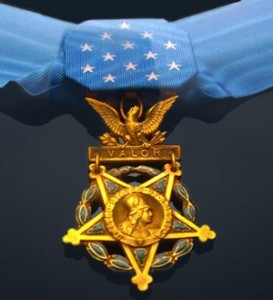Congressional Medal of Honor
 Someone sent me an email about the passing of a Congressional Medal of Honor winner and how the media did not report on it. I looked and it appears that Capt Ed. Freeman passed away in 2008, but it struck me that we still should honor him. Below is his Citation:
Someone sent me an email about the passing of a Congressional Medal of Honor winner and how the media did not report on it. I looked and it appears that Capt Ed. Freeman passed away in 2008, but it struck me that we still should honor him. Below is his Citation:
FREEMAN, ED W.
By direction of the President, under the Joint Resolution of Congress approved 12 July 1862 (amended by act of 3 March 1863, act of 9 July 1918, and act of 25 July 1963), the Medal of Honor for conspicuous gallantry and intrepidity at the risk of life above and beyond the call of duty, is awarded by the Department of the Army in the name of Congress to:
CAPTAIN ED W. FREEMAN
UNITED STATES ARMYCaptain Ed W. Freeman, United States Army, of Boise, Idaho, who distinguished himself by numerous acts of conspicuous gallantry and extraordinary intrepidity on 14 November 1965 while serving with Company A, 229th Assault Helicopter Battalion, 1st Cavalry Division (Airmobile). As a flight leader and second in command of a 16-helicopter lift unit, he supported a heavily engaged American infantry battalion at Landing Zone X-Ray in the Ia Drang Valley, Republic of Vietnam. The unit was almost out of ammunition after taking some of the heaviest casualties of the war, fighting off a relentless attack from a highly motivated, heavily armed enemy force. When the infantry commander closed the helicopter landing zone because of intense direct enemy fire, Captain Freeman risked his life by flying his unarmed helicopter through a gauntlet of enemy fire time after time, delivering critically needed ammunition, water, and medical supplies to the besieged battalion. His flights, by providing the engaged units with supplies of ammunition critical to their survival, directly affected the battle’s outcome. Without them the units would almost surely have gone down, with much greater loss of life. After medical evacuation helicopters refused to fly into the area because of intense enemy fire, Captain Freeman flew 14 separate rescue missions, providing lifesaving evacuation of an estimated 30 seriously wounded soldiers-some of whom would not have survived had he not acted. All flights were made into a small emergency landing zone within 100 to 200 meters of the defensive perimeter, where heavily committed units were perilously holding off the attacking elements. Captain Freeman’s selfless acts of great valor and extraordinary perseverance were far above and beyond the call of duty or mission and set a superb example of leadership and courage for all of his peers. Captain Freeman’s extraordinary heroism and devotion to duty are in keeping with the highest traditions of military service and reflect great credit upon himself, his unit, and the United States Army.
GB²
